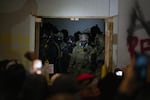An internal Department of Homeland Security report assessing the agency’s intelligence collection on Portland racial justice protesters in 2020 has been released nearly in its entirety. A heavily redacted version of the report was released in 2021.
The newly public portions show in more granular detail how Acting Secretary of Homeland Security Chad Wolf and Acting Deputy Secretary Ken Cuccinelli led efforts to politicize intelligence operations in Portland, in many instances pushing constitutional boundaries.
The now un-redacted portions of the report describe the two agency heads requesting so-called operational background reports, known as OBRs or “baseball cards,” on every person who attended protests, a request that would have entailed intelligence dossiers on potentially thousands of Portlanders. That was apparently motivated by a belief that a “U.S person” was funding the protests in the city.

Federal officers confront people protesting racism and police violence in front of the Mark O. Hatfield federal courthouse on July 12, 2020. Earlier in the night, federal law enforcement officers shot a demonstrator in the head with a "less lethal" impact munition, causing severe injury.
Jonathan Levinson / OPB
Since 2020, Oregon Senator Ron Wyden and other members of Oregon’s congressional delegation have pressed the Justice Department and DHS for more details about the Trump administration’s response to the 2020 racial justice protests. In a statement Thursday, Wyden said Oregonians have a right to a full accounting of the Trump administration’s “twisted efforts to provoke violence in Portland for his political gain.”
“Now the public knows much more about how political DHS officials spied on Oregonians for exercising their First Amendment right to protest and justified it with baseless conspiracy theories,” Wyden said.
Rather than compiling reports on every protest attendee, as originally directed, the Department of Homeland Security’s Intelligence and Analysis personnel put together baseball cards on only those people who had been arrested or charged with “violent acts.” Those reports include past criminal history, travel history, “derogatory information from DHS or Intelligence Community holdings,” as well as publicly available social media. Draft reports included friends lists from social media accounts but even the final reports included “some of their First Amendment speech activity (posts) were still collected.”
The intelligence collection operation coincided with a federal law enforcement deployment to Portland that lasted for over a month in 2020. The contingent, made up of officers from the U.S. Marshals Service, Federal Protective Service and Customs and Border Protection, had limited training in crowd control. Their violent tactics and the popular resistance they sparked fed a Trump administration narrative that Portland was under siege by what the administration routinely characterized as violent antifa terrorists.
Now, the unredacted report shows how that narrative trickled down through the agency and impacted operations on the ground, politicizing intelligence in ways that many found alarming.
“[Acting Under Secretary for Intelligence and Analysis Brian Murphy’s] intended purpose was to use the OBRs to confirm his suspicions that a link existed amongst the arrestees and identify a single individual or group that was “masterminding” the attacks,” the report reads.
Murphy, whose name had been redacted until now, also insisted analysts refer to protesters as “Violent Antifa Anarchist Inspired,” a demand analysts had long insisted was not grounded in any of their intelligence collection.
“For weeks, the analysts had been telling Mr. Murphy that because ANTIFA was not in the collection, it could not be put into the analysis,” the newly unredacted portions read, making clear that the previously unnamed Murphy forced his political views into intelligence over the objection of analysts.
“Notwithstanding this feedback from the I&A analysts, on July 25, 2020, Mr. Murphy sent an email to his senior leadership instructing them that henceforth, the violent opportunists in Portland were to be reported as VAAI,” the report reads, using the acronym for “violent antifa anarchists inspired.”
An associate general counsel thought the email was so egregious that it constituted a questionable intelligence activity and warranted being briefed to the Director of National Intelligence, according to the report.
Portland was one of several cities seeing large-scale protests after George Floyd’s murder. The federal government’s response was so ad hoc and rushed that at one point intelligence personnel supporting operations in Portland and elsewhere bought laptops for new hires at a Washington D.C. Best Buy, prompting two people to complain they had been given equipment lacking the usual suite of security software they expected on a sensitive government computer.
“Without these tools, they believed that they were vulnerable to any nefarious actors looking to expose their private information, doxx DHS personnel, or invade the employee’s home network,” the report says.
The unredacted report was released after Kenneth Wainstein, the current Undersecretary for Intelligence and Analysis revised the organization’s public records policies at Wyden’s behest. The new policy requires the disclosure of sources and methods, typically closely guarded tools for collecting intelligence, unless the disclosure would “materially negate” their effectiveness.
